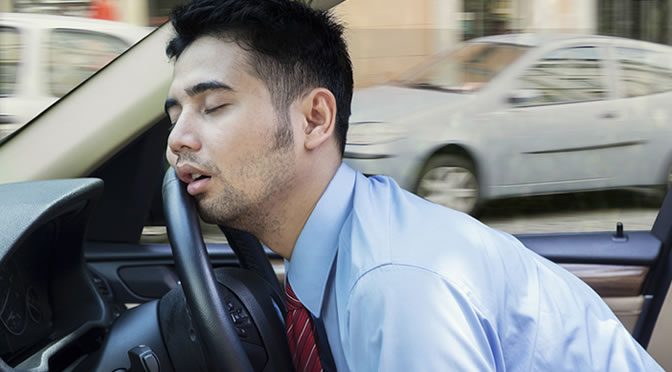Missing just one to two hours of the recommended seven hours sleep at night will double your chances of a car crash next day.
Drivers who sleep less than five hours daily are at 4 times the crash risk.
For those who get less than four hours of sleep, their chances of a car crash will increase to 11 times, the AAA Foundation for Traffic Safety warned.
Here is the outline of sleep-deprived drivers’ crash risk reported by the AAA Foundation:
- 6-7 hours sleep: x 1.3 risk
- 5-6 hours sleep: x 1.9 risk
- 4-5 hours sleep: x 4.3 risk
- > 4 hours sleep: x 11.5 risk
According to the Centers for Disease Control and Prevention, 35% of American drivers sleep less than seven hours in a 24-hour period.
It is estimated that in 2013 drowsy driving was responsible for 72,000 crashes, 800 death and 44,000 injuries.
Drowsy driving happens due to fatigue, poor sleep, shift work, medications and drinking alcohol, which puts people’s lives in danger and causes tragic results.
Poor sleep lowers attention behind the wheel and so reduces ability to make correct and timely decisions on the roads.
The risk of accidents due to less than five hours sleep is similar to driving over the legal limit for alcohol.
Dr David Yang, executive director for the AAA Foundation for Traffic Safety, said:
“You cannot miss sleep and still expect to be able to safely function behind the wheel.
Our new research shows that a driver who has slept for less than five hours has a crash risk comparable to someone driving drunk.”
Warning signs of drowsy driving include:
- eyes feel heavy,
- repetitive blinking or yawning,
- feeling irritable,
- trouble seeing ,
- drifting across lane,
- problem recalling last few miles driven,
- micro-sleep (sleep which may last for a fraction of time)
- and missing exits or traffic signs.
Nevertheless, over 50% of drivers involved in sleep related accidents experienced no symptoms before dropping off behind the wheel.
The AAA Foundation warn drivers to have plenty of sleep, especially before long road trips.
Here is some more advice:
- Have a break every 100 miles or two hours driving.
- Don’t travel at night.
- Don’t eat heavy foods as they make you feel sluggish.
- Don’t take medicines that cause drowsiness.
- Share your driving with an alert passenger.
Mr Jake Nelson, director of Traffic Safety Advocacy and Research for AAA, said:
“Managing a healthy work-life balance can be difficult and far too often we sacrifice our sleep as a result.
Failing to maintain a healthy sleep schedule could mean putting yourself or others on the road at risk.”
The report published by the AAA Foundation for Traffic Safety (Brian Tefft, 2016).
Drowsy driving image from Shutterstock
